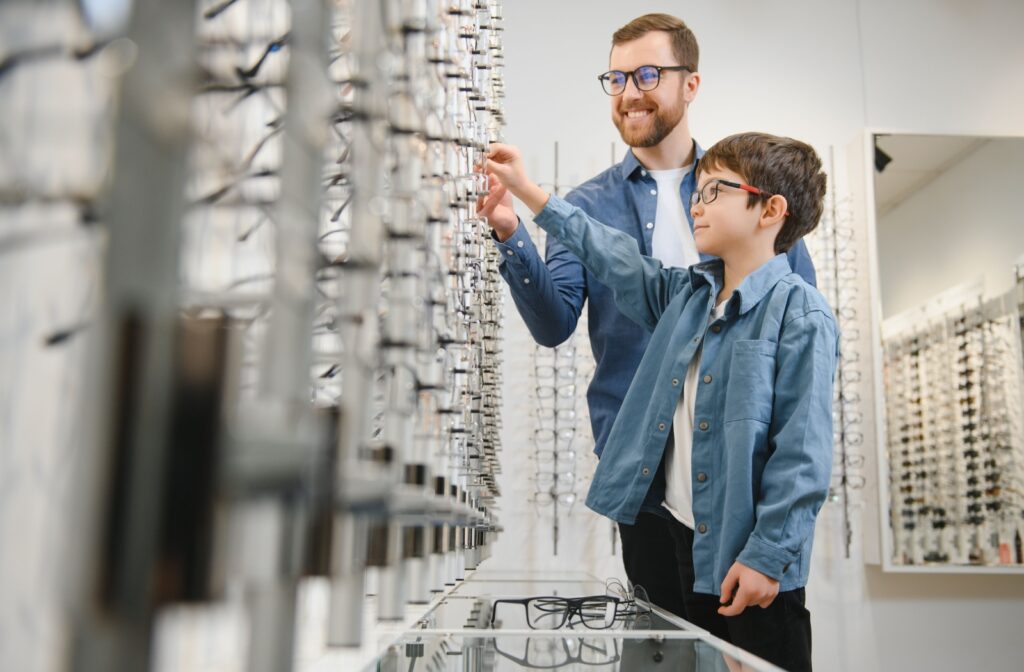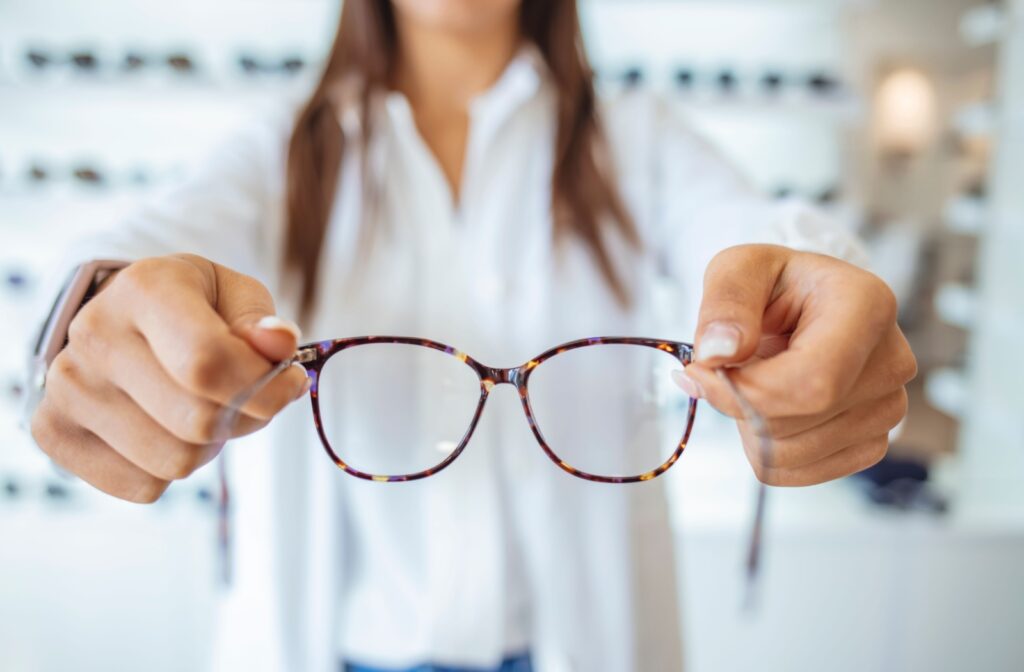If you’ve heard the myth that wearing glasses makes your vision worse, you’re not alone, but it isn’t true. Eyeglasses don’t make your vision worse. Instead, they support your vision by correcting how light enters your eyes, helping it focus properly on the retina.
Whether you’re dealing with nearsightedness, farsightedness, astigmatism, or age-related changes, the right pair of glasses can make everyday tasks more comfortable and reduce eye strain.
Glasses are a practical, non-invasive way to manage vision challenges and support eye health at any age. With the right fit and prescription, eyeglasses can help you see more clearly and comfortably.
How Eyeglasses Can Help Improve Vision
Wearing eye glasses doesn’t weaken your eyes. It’s normal for your prescription to change over time due to natural eye changes or health issues. Eyeglasses help you by bending light to properly focus on your retina.
This process addresses how your eye’s shape affects the way light is focused, helping to correct refractive errors. With the right prescription, eyeglasses help you see clearly and reduce eye strain, whether you’re reading, driving at night, or using a computer.
Digital Eye Strain
Have you ever been staring at the computer screen and started to feel fatigued? That discomfort is called digital eye strain, caused by prolonged screen use. Wearing glasses with blue light filters can help reduce symptoms like headaches and blurry vision.
Supporting Focus & Daily Performance
When your vision isn’t clear, it can affect how well you concentrate at work, school, or during everyday tasks. Wearing the right eyeglasses helps you stay focused and think more clearly throughout the day.
Who Might Benefit from Wearing Glasses
Eyeglasses are a common solution for many people with vision concerns, but they are not a one-size-fits-all approach. If you’ve been noticing changes in how well you see, glasses may offer the support you need.
- Nearsightedness (myopia): Glasses can improve your ability to see objects clearly at a distance.
- Farsightedness (hyperopia): Eyeglasses can help make reading, writing, or other close-up tasks more comfortable.
- Age-related vision changes (presbyopia): If you are over 40 and finding it harder to see up close, options like reading glasses or progressive lenses can help.
- Astigmatism: When the cornea is irregularly shaped, glasses can correct the resulting blurriness or visual distortion.
- Digital eye strain: For people who spend long hours on computers or screens, lenses with blue light filters may ease discomfort and support healthier screen habits.
Whether your vision challenges are related to age, daily habits, or specific refractive errors, the right pair of glasses can help you see more clearly and feel more comfortable throughout the day.
Choosing Glasses That Work for You
Finding the right pair of eyeglasses involves more than just vision correction. The right glasses should fit your lifestyle, feel comfortable, and reflect your personal style.
Start with an Eye Exam
A comprehensive eye exam helps determine your current prescription and assess your overall eye health. These visits are also an important opportunity to catch early signs of eye disease.
Think About Your Routine
Lifestyle plays a big role in choosing the right eyewear. If you spend time outside, prescription sunglasses or lenses that adapt to light may be helpful. For those who work on digital screens, blue light-blocking lenses can add comfort during the day.
Pick a Style That Feels Like You
Eyeglass frames come in many shapes, materials, and colours. If you prefer a classic or professional look, simple designs in metal or neutral tones may suit you. If you like to make a statement, bolder colours or larger frames can add personality.
Make Sure They Fit
Comfort is key. Glasses should sit securely without slipping, pinching, or causing pressure on your nose or ears. A trained optician can help adjust your frames so they fit just right. Trying on multiple frames can highlight what feels right.
Choose Quality Materials
Well-made glasses tend to feel better and last longer. Lightweight materials like titanium or durable acetate offer a good balance of comfort and durability. While they may cost more upfront, investing in quality often leads to better long-term value.

Vision Correction Alternatives to Glasses
Glasses are a trusted option for many people, but they’re not the only way to correct your vision.
Contact Lenses
Contacts offer the same vision correction as glasses but are worn directly on the eye. They are often preferred for physical activity or when glasses may get in the way.
Laser Eye Surgery
Refractive surgery can provide a longer-term option by reshaping the cornea to correct common vision problems. It’s important to note that not everyone is a candidate, and your eye doctor can help assess whether this is the right option for you.
Orthokeratology (Ortho-K)
Ortho-k lenses are worn overnight and gently reshape the cornea while you sleep. This allows for clear vision during the day without glasses or contacts. It may be a suitable choice for some individuals, especially those with active lifestyles.
Healthy Habits for Eye Comfort
Even with corrective options, your daily habits play a role in supporting eye health. Limiting screen time, using proper lighting, taking breaks during close-up work, and maintaining a balanced diet can all contribute to more comfortable vision.
Seeing Clearly with the Right Eyewear
Choosing the right eyeglasses is about more than just improving your vision. It’s also about feeling confident and comfortable in how you see the world. With the right lenses and frames, you can reduce eye strain, support your daily activities, and express your personal style.
Whether you’re exploring vision correction options for the first time or updating an existing prescription, taking the time to find the right fit can make a meaningful difference in your day-to-day life.
If you’re experiencing changes in your vision or eye comfort, schedule a comprehensive eye exam at Riverside Optometry is the first step toward seeing clearly and comfortably.



